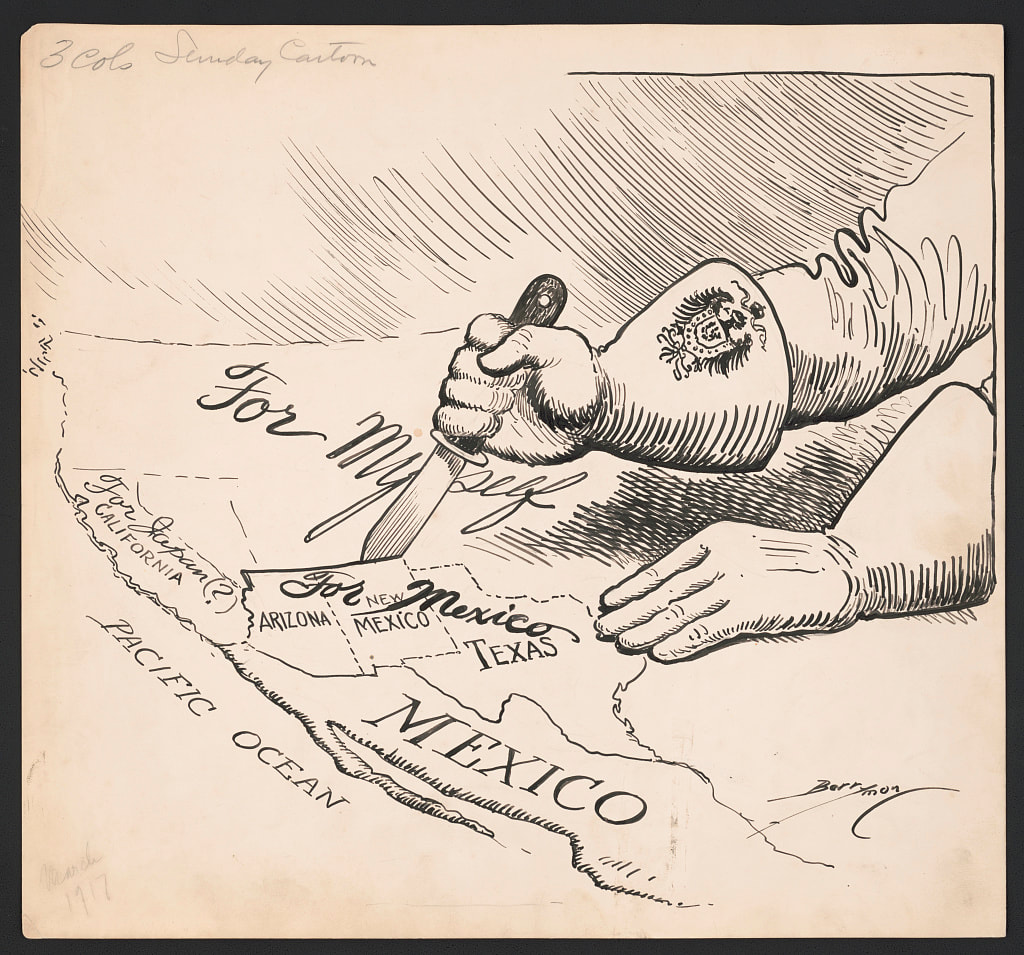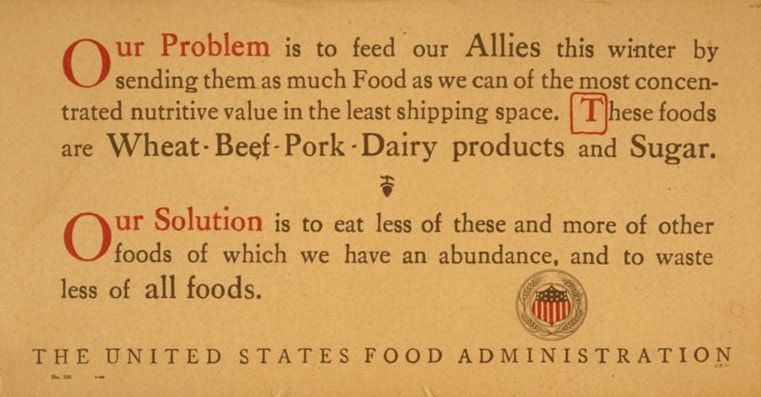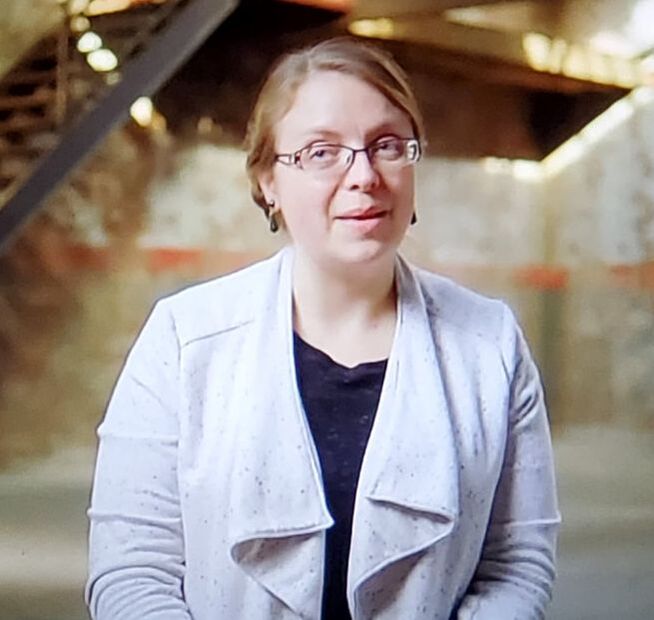 This World War I cartoon shows a hand in a gauntlet (decorated with the imperial German eagle) carving up a map of the Southwestern United States. Arizona, New Mexico, and Texas are labeled "For Mexico." California is labeled "For Japan(?)" The rest of the country is labeled "For Myself." In the spring of 1917, the British government intercepted and turned over to the United States a message from German Foreign Secretary Arthur Zimmerman to the Government of Mexico, urging Mexico to join with Japan and declare war on the United States. Zimmerman suggested that this would be a way for Mexico to reclaim the Southwestern states lost during the Mexican War. American outrage following the publication of the Zimmerman Telegram was one of the factors causing the U.S. to declare war on Germany. Berryman follows the popular notion that the German Kaiser was the force behind German aggression. Illustration by Clifford Kennedy Berryman, March 4, 1917. Library of Congress. On April 2, 1917, President Woodrow Wilson, the man who had won his 1916 presidential reelection by running on the phrase, "He Kept Us Out of War," went before Congress and gave a speech. It was a speech a long time coming. Since Europe had devolved into war in August of 1914, the United States had officially remained neutral. On May 7, 1915, the Lusitania was sunk, the victim of German U-Boats, taking 123 American citizens with it. Despite this attack on innocent civilians, the U.S. remained staunchly neutral. In February, 1917, the Zimmerman Telegram was revealed - an appeal by Germany to Mexico to form an alliance against the United States, should the U.S. enter the war. Sent in January and decrypted by British Intelligence, it was sent just before Germany resumed unrestricted submarine warfare, a tactic they feared would result in the end of American neutrality. And indeed, it did. Unrestricted submarine warfare resumed on February 1, 1917. Wilson gave a speech before Congress on February 3rd, and then again on February 26th regarding U-boats and merchant shipping. On April 2nd, Wilson asked Congress to declare war on Germany. I have called the Congress into extraordinary session because there are serious, very serious, choices of policy to be made, and made immediately, which it was neither right nor constitutionally permissible that I should assume the responsibility of making. On the 3rd of February last, I officially laid before you the extraordinary announcement of the Imperial German government that on and after the 1st day of February it was its purpose to put aside all restraints of law or of humanity and use its submarines to sink every vessel that sought to approach either the ports of Great Britain and Ireland or the western coasts of Europe or any of the ports controlled by the enemies of Germany within the Mediterranean. That had seemed to be the object of the German submarine warfare earlier in the war, but since April of last year the Imperial government had somewhat restrained the commanders of its undersea craft in conformity with its promise then given to us that passenger boats should not be sunk and that due warning would be given to all other vessels which its submarines might seek to destroy, when no resistance was offered or escape attempted, and care taken that their crews were given at least a fair chance to save their lives in their open boats. The precautions taken were meager and haphazard enough, as was proved in distressing instance after instance in the progress of the cruel and unmanly business, but a certain degree of restraint was observed. The new policy has swept every restriction aside. Vessels of every kind, whatever their flag, their character, their cargo, their destination, their errand, have been ruthlessly sent to the bottom without warning and without thought of help or mercy for those on board, the vessels of friendly neutrals along with those of belligerents. Even hospital ships and ships carrying relief to the sorely bereaved and stricken people of Belgium, though the latter were provided with safe conduct through the proscribed areas by the German government itself and were distinguished by unmistakable marks of identity, have been sunk with the same reckless lack of compassion or of principle. (read the whole speech) On April 4, 1917, the Senate voted to declare war. On April 6, the House of Representatives followed suit. The U.S. was now officially at war with Germany.  "Our Problem is to feed our Allies this winter by sending them as much Food as we can of the most concentrated nutritive value in the least shipping space. These foods are Wheat - Beef - Pork - Dairy products and Sugar. Our Solution is to eat less of these and more of other foods which we have in abundance, and to waste less of all foods. The United States Food Administration." c. 1917, Library of Congress. On April 17, 1917, Wilson addressed the nation: I take the liberty, therefore, of addressing this word to the farmers of the country and to all who work on the farms: The supreme need of our own nation and of the nations with which we are coordinating is an abundance of supplies, and especially of food-stuffs. The importance of an adequate food supply, especially for the present year, is superlative. Without abundant food, alike for the armies and the peoples now at war, the whole great enterprise upon which we have embarked will break down and fail. The world's food reserves are low. Not only during the present emergency but for some time after peace shall have come both our own people and a large proportion of the people of Europe must rely upon the harvests in America. Upon the farmers of this country, therefore, in large measure, rests the fate of the war and the fate of the nations. May the nation not count upon them to omit no step that will increase the production of their land or that will bring about the most effectual coordination in the sale and distribution of their products? The time is short. It is of the most imperative importance that everything possible be done and done immediately to make sure of large harvests. I call upon young men and old alike and upon the able-bodied boys of the land to accept and act upon this duty to turn in hosts to the farms and make certain that no pains and no labor is lacking in this great matter. I particularly appeal to the farmers of the South to plant abundant food-stuffs as well as cotton. They can show their patriotism in no better or more convincing way than by resisting the great temptation of the present price of cotton and helping, helping upon a great scale, to feed the nation and the peoples everywhere who are fighting for their liberties and for our own. The variety of their crops will be the visible measure of their comprehension of their national duty. The Government of the United States and the governments of the several States stand ready to coordinate. They will do everything possible to assist farmers in securing an adequate supply of seed, an adequate force of laborers when they are most needed, at harvest time, and the means of expediting shipments of fertilizers and farm machinery, as well as of the crops themselves when harvested. The course of trade shall be as unhampered as it is possible to make it and there shall be no unwarranted manipulation of the nation's food supply by those who handle it on its way to the consumer. This is our opportunity to demonstrate the efficiency of a great Democracy and we shall not fall short of it! This let me say to the middlemen of every sort, whether they are handling our food-stuffs or our raw materials of manufacture or the products of our mills and factories: The eyes of the country will be especially upon you. This is your opportunity for signal service, efficient and disinterested. The country expects you, as it expects all others, to forego unusual profits, to organize and expedite shipments of supplies of every kind, but especially of food, with an eye to the service you are rendering and in the spirit of those who enlist in the ranks, for their people, not for themselves. I shall confidently expect you to deserve and win the confidence of people of every sort and station. (read the entire speech) Wilson's emphasis on food was not without warrant. The U.S. and Argentina, the two major wheat-exporting countries in the Western hemisphere (excepting Canada), had both experienced poor harvests in 1916, after bumper crops in 1914 and 1915. In short, when the U.S. entered the war in April of 1917, it had only enough wheat for domestic consumption. Although the initial rollout of food regulation was uneven, in large part due to the fact that Congress blocked funding of the United States Food Administration until August of 1917, calls for voluntary reduction in consumption of certain foods, like those listed in the poster above, were almost immediate, as were calls to reduce food waste and increase food production. Wilson knew that defeating German aggression meant putting the United States' abundant resources to work - agricultural land, people, and industry. As with all wars, he who controls the food supply, controls the outcome of the war, something that proved true with the First World War as much as any war, and one in which the United States made a huge difference. The Food Historian blog is supported by patrons on Patreon! Patrons help keep blog posts like this one free and available to the public. Join us for awesome members-only content like free digitized cookbooks from my personal collection, e-newsletter, and even snail mail from time to time!
0 Comments
|
AuthorSarah Wassberg Johnson has an MA in Public History from the University at Albany and studies early 20th century food history. Archives
July 2024
Categories
All
|

 RSS Feed
RSS Feed